If you fill out the "Forgot Password" form but don't get an email to reset your password within 5-10 minutes, please email logistics@ire.org for assistance.
(March 24, 2025) – The Board of Directors will discuss a change to Article 10 of the organization’s Code of Bylaws at its April 18, 2025, meeting.
The Governance Committee will meet on April 4, 2025, and will be reviewing the proposed update to the bylaws, and will advise the Board.
Proposed Amendment:
“The Endowment Funds are monitored by a Finance Committee that is chaired by the Treasurer and includes six other members of IRE, including one Director. That Director and two of the other members are nominated by the President; the others are nominated by the Treasurer. All are nominated after the annual officer elections and must be approved by the IRE Board. One of the six nominees may be a financial professional who is not an IRE Member. The others must be IRE Members. They serve for two-year terms. The Finance Committee works on fundraising, oversees ongoing revenues and expenses, monitors the Endowment Funds and advises the Board on investment practices.”
If you have comments or questions about this proposed amendment, contact IRE’s Treasurer Mark Greenblatt (mark.greenblatt@asu.edu ) or the chair of IRE’s governance committee Sarah Cohen (sarah.h.cohen@gmail.com).
(March 18, 2025) — NICAR25 brought together more than 900 journalists, educators and students in Minneapolis!
With three-and-a-half days of programming on investigative and data journalism techniques, mapping, programming, AI and so much more, the conference is always packed to the max with practical knowledge and inspiring words of wisdom. Not to mention everything you learn outside of formal classes, by meeting and mingling with fellow colleagues and mentors.
Here are 25 things we learned at NICAR25.
1. “Your data story is not about data. It’s about people.” — Carrie Cochran, Jodie Fleischer (Cox Media Group), and Tom Scheck (APM Reports).
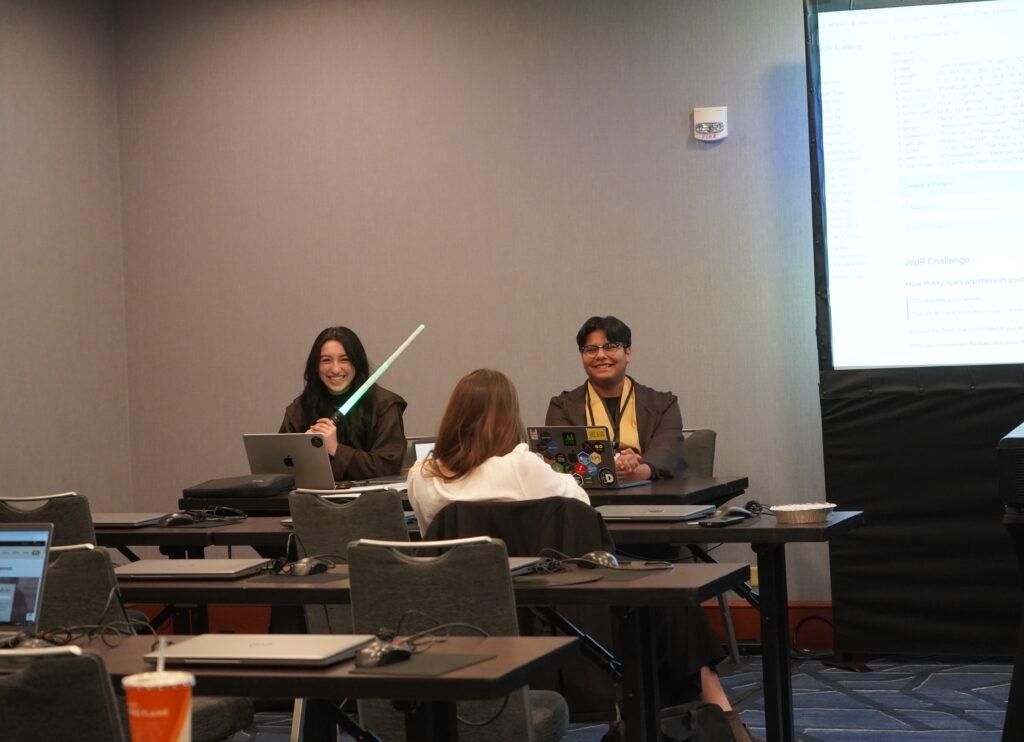
2. Data journalism on college campuses is looking strong! We had students from CUNY, Indiana University, Mizzou, UC Berkeley, University of Minnesota, Syracuse University, University of Texas at Austin — just to name a few. Some students, like Yasmin Garcia and Johan Villatoro, even taught alongside their professors.
3. So many tools are free! RECAP has free documents from PACER archive, and you can set up alerts on court cases you’re watching. Notebook LM will summarize your documents after uploading. Google Pinpoint can help with bulk document search, summarization, and extraction. Check out more time-saving tools here, thanks to Pooja Dantewadia (Realtor.com), Tyler Dukes (McClatchy Media) and Cynthia Tu (Sahan Journal).
4. “I learned how to scrape data into Google Sheets!!” — Claire Rafford, Mirror Indy
5. ”I know how to make a pivot table now” — Dené K. Dryden, The Rochester Post Bulletin

6. “I learned about tugboatinformation.com - a truly wonderful meticulous listing of every tugboat. There's a tugboat in the news in Half Moon Bay, where I live — and I found a page about it on the site! The internet is still a wonderful place.” — Simon Willison, simonwillison.net
7. Singer Bonnie Raitt loves investigative journalism! ESPN reporter Tisha Thompson gave a surprise Lightning Talk about a reporting journey that ended up with her on stage at a Bonnie Rait concert. She spoke about the power of watchdog reporting and the challenges investigative journalists face today. Raitt made a $23K donation to Investigative Reporters and Editors afterwards.
8. The last time IRE went to Minneapolis was more than 30 years ago. The IRE Conference of 1988 was held in the Twin Cities.
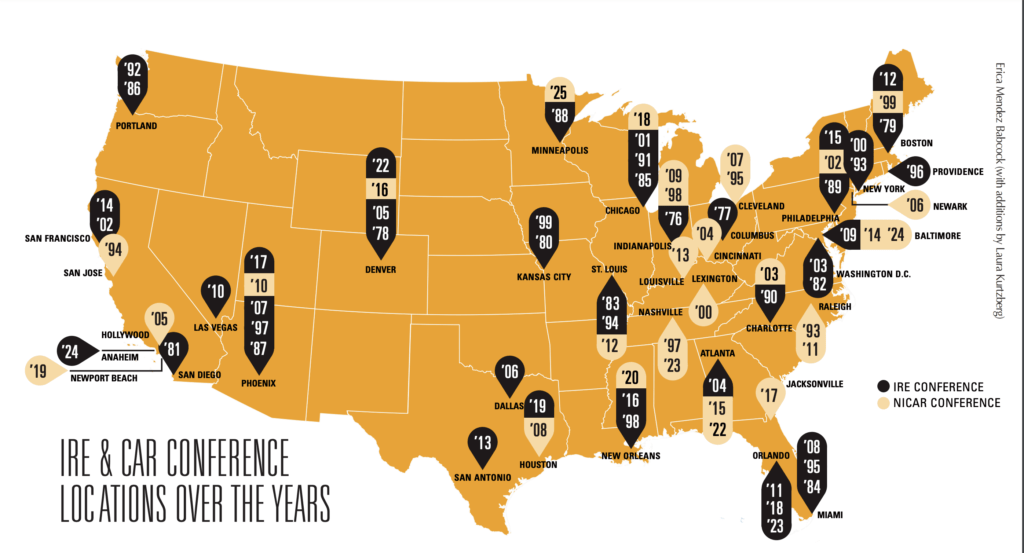
9. “Approach AI with cautious curiosity” — Mike Reilley. Check out his free newsletter Journalist’s Toolbox™ for AI tools, resources and training videos for journalists.
10. The 1996 film Fargo is based in Minneapolis. Irene Casado Sanchez, of Big Local News, was the designer of this year’s NICAR T-shirt! Check out her t-shirt, inspired by the film poster!
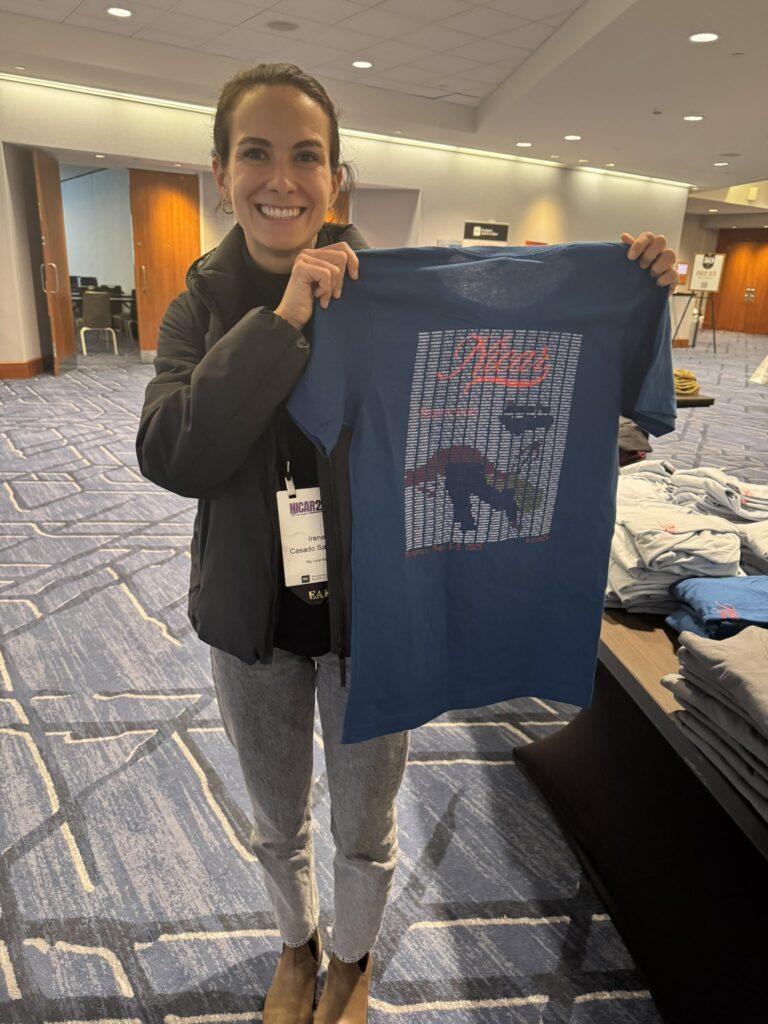
11. There are so many government datasets that can be downloaded for free as Excel or CSV files and localized to any city, county or state in the United States. Here are 50, shared by David Cuillier and Sydney Sims of the Brechner FOI Project. These datasets can help with research, story ideas, finding trends and much more.
12. NICAR stands for the National Institute of Computer-Assisted Reporting, but it’s gone through a few different name changes. At one point, it was just “CAR,” later becoming “MICAR” for its home-base at Mizzou. It officially became NICAR in 1994.
13. “I learned that there are numerous valid uses for artificial intelligence and machine learning in the newsroom. However, auditing and validating these models and their outputs is essential before publishing or further reporting. Additionally, NICAR25’s various sessions helped me realize the importance of understanding development environments before installing project-specific libraries (hopefully you can avoid cluttering your global environment like I did).” — Diego Torrealba, University of Texas at Austin
14. The difference between a hot dish and a casserole, thanks to Taylor Miller Thomas.
15. The NICAR crowd loves games! We had two nights of NIghtCAR, where attendees played board games and put together puzzles after sessions. We also hosted karaoke and a data-themed scavenger hunt!
16. “Minnesota nice” is a thing. Our local IRE friends brought coats and other warm weather gear for people from out of town.
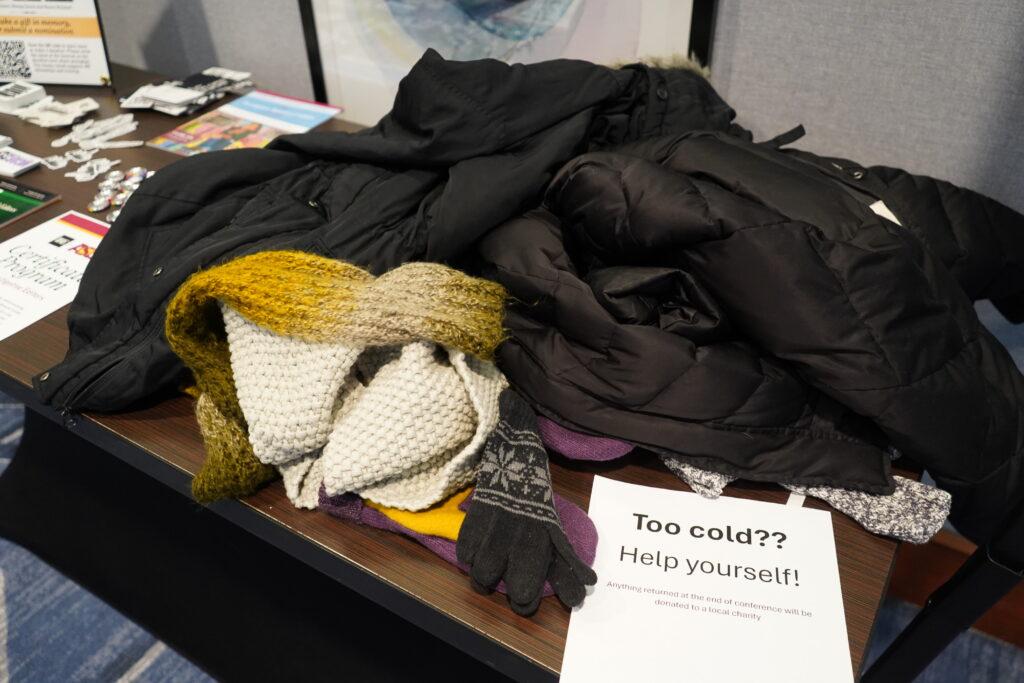
17. There are pros and cons to different languages. Carla Astudillo (Texas Tribune), Tazbia Fatima (Hearst), Nael Shiab (CBC News) and Kai Teoh (The Dallas Morning News) shared their preferences on what to use for breaking news, scraping data, building a database, and training an AI model.
18. Satellite images can help you with your investigation, and they’re not just for weather events! Sentinel 2 images from every 5 days are free and easy to download from Copernicus Browser.
19. “Learning about BillTrack50 at #NICAR25. It has both free & paid versions, & its features include allowing you to search by keyword & by state, & for similar bills. I’ve already signed up for an account. It also includes federal legislation in search results” — Becky Yerak, WSJ
20. Great investigative projects take time. “Be willing to do tedious work that others aren’t doing — like data entry to analyze 17,000+ trips taken by lawmakers paid for by private entities” — tip from Maggie Mulvihill, shared by Michael Beckel
21. Need data viz on deadline? The open source RAWGraphs web app can help with making charts and graphs, and you don’t need to sign up! Check out more time-saving tools flagged by Rowan Philp at the Global Investigative Journalism Network (GIJN).
22. IRE member Sharon Machlis has compiled tipsheets and slides from NICAR conferences since 2020!
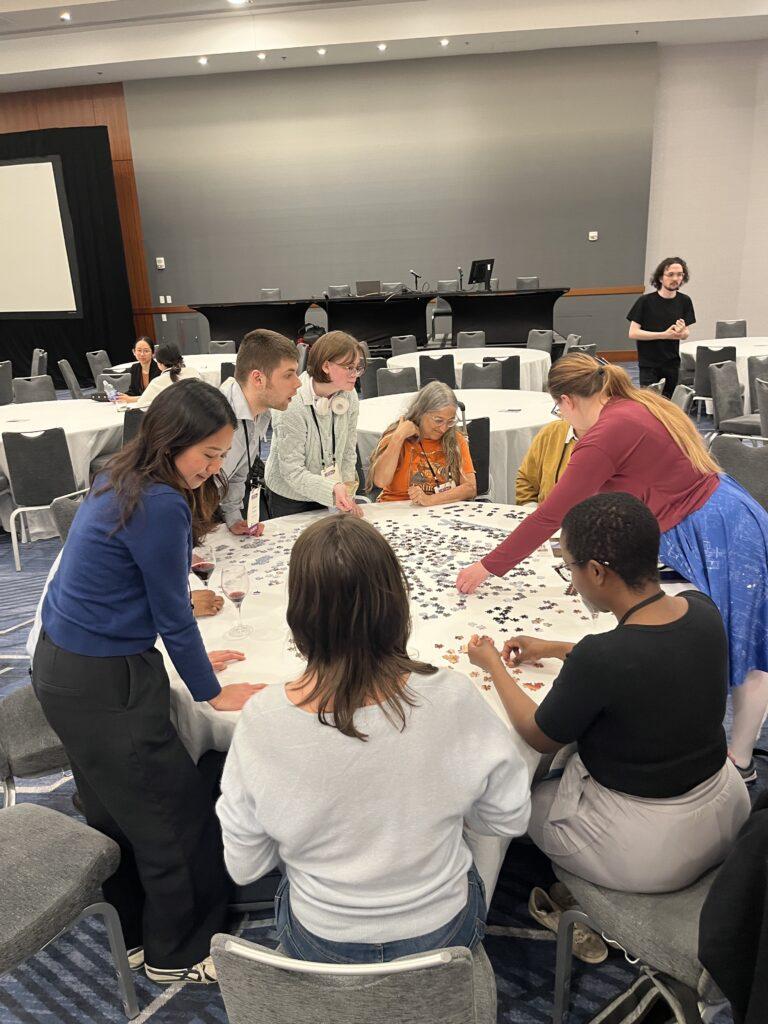
23. You’re always welcome here! “I hadn't been to a NICAR since 2018, somehow, but felt like I've never left. Best event for both practical skill-building and mission inspiration, even/especially in our current industry headwinds. And it was great to make some new friends (in the conference hallways and at the combination drag/soccer bar) and reconnect with many old ones.” — Tyler Machado, independent journalist
24. “A really lovely common thread I’m hearing at multiple #NICAR25 panels: Speakers talking about the time before they were good at what they did. We all started somewhere.” — Emily Hopkins, Mirror Indy
25. If you’re crowdsourcing for information, make sure the link to your survey is public (as we at IRE learned while putting together this blog post…). For actual tips on crowdsourcing data, see this tipsheet from Asia Fields (ProPublica), Jeremy Merrill (The Washington Post) and Leon Yin (Bloomberg News).
The NICAR Conference is IRE’s annual data journalism conference. IRE members can access tipsheets and select session recordings from the conference online. Join us next year - March 5-8, 2026 - in Indianapolis!
(March 5, 2025) — Manny García, Editor in Chief at Houston Landing, and Shawn McIntosh, Head of Standards and Practices at The Atlanta Journal-Constitution, have been nominated for the prestigious IRE Ring of Honor.
The Ring of Honor is a fundraising initiative that supports fellowships for investigative journalists and celebrates legendary current and past members of Investigative Reporters and Editors.

Both past presidents of the IRE Board of Directors, García and McIntosh are renowned standard bearers for investigative and data journalism and beloved mentors in the IRE community.
Born in Cuba and raised in Miami, García is a two-time Pulitzer Prize winner who has held leadership positions at major institutions including the Miami Herald, Nuevo Heraldo, USA Today Network and the Pro Publica-Texas Tribune Investigative Unit, among others.
McIntosh, a pioneer in computer-assisted reporting and founder of NICAR, has been at The Atlanta Journal-Constitution for more than 22 years. She also serves on the board of the Georgia First Amendment Foundation.
García and McIntosh join the late John Bones as the three nominees for the IRE Ring of Honor. Bones, known as the father of data journalism in Norway, was an IRE stalwart before his untimely death last year.
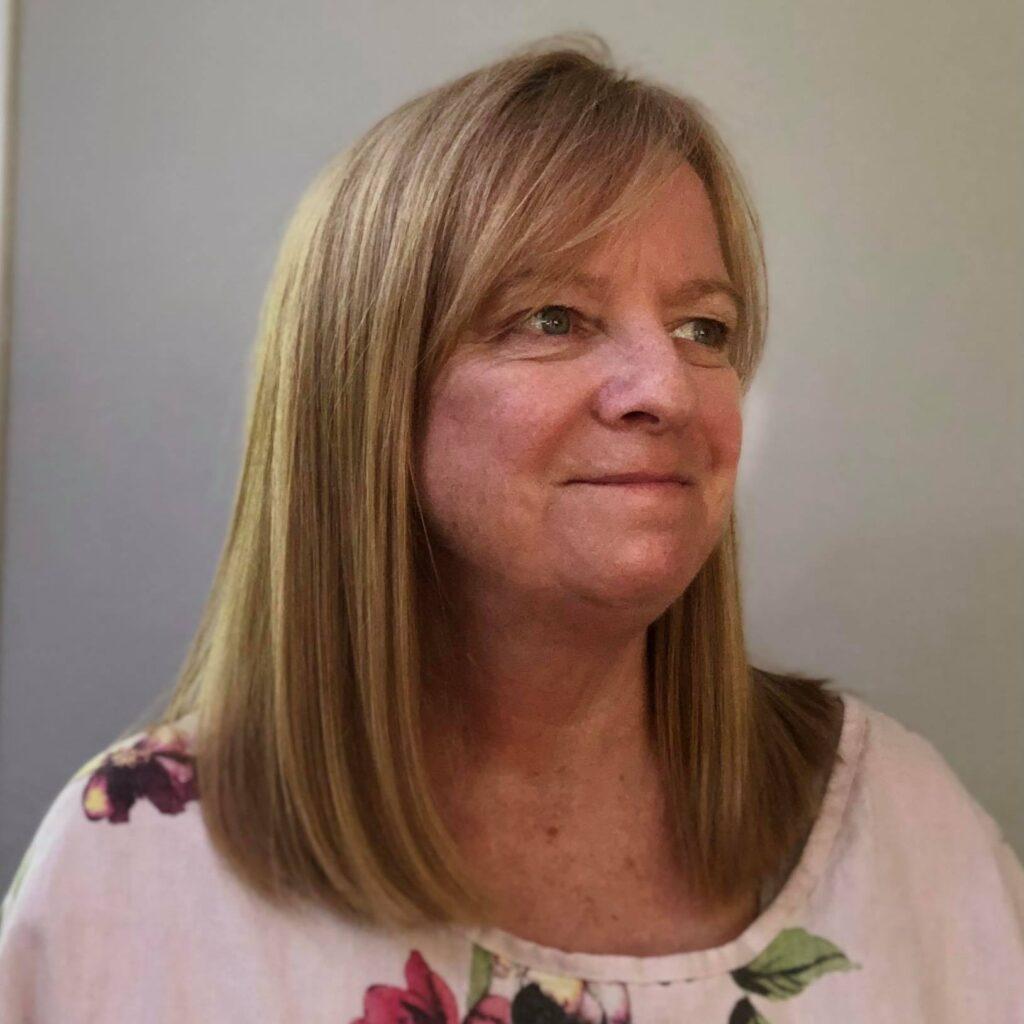
“It is fitting that in the year we are celebrating our 50th anniversary, IRE is looking at paying tribute to three of our most important firsts: John Bones, the first international IRE member nominated for the Ring of Honor; Shawn McIntosh, our first female nominee; and Manny García, the first person of color elected president of IRE,” said IRE Executive Director Diana R. Fuentes.
“Manny and Shawn continue to be active members of IRE and are admired mentors for the next generation of journalists,” Fuentes said. “We are privileged to count them among our ranks. John was taken from us too soon. He is sorely missed.”
The Ring of Honor, an initiative started in 2022, is open to current and past members of IRE. After a member is nominated for the Ring of Honor, the IRE Board of Directors reviews the nomination. If the nomination is approved, friends and family conduct a campaign to raise funds to honor the nominee. A minimum of $2,500 in donations is required to induct the nominee into the Ring of Honor.
The funds provide fellowships and help journalists and students gain access to IRE’s top-of-the-line training, resources and networking opportunities.
Bones, who was nominated in October, will be inducted into the Ring of Honor at the 2025 IRE Conference in New Orleans. You can learn more about his campaign here.
Bones was general manager of SKUP, the Norwegian counterpart of IRE, when he died of cancer May 13, 2024. He was 69. He had previously been in leadership roles at VG, the most-read daily in Norway. Bones regularly brought groups of international journalists to NICAR and the IRE Conference.
The nominations for García and McIntosh were approved at the Feb. 7 board meeting.
García served on the IRE Board of Directors from 2006 to 2014; he was elected president in 2011, serving one term. McIntosh served on the board from 1994 to 2006 and was first elected president in 2002, serving two terms.
Learn more and donate to García’s campaign here. Learn more and donate to McIntosh’s campaign here.
“All three have contributed significantly not only to our organization, but to our industry as a whole,” Fuentes said. “They helped shape investigative and data journalism as we know it today.”
The organizers of the campaigns for García and McIntosh hope to complete fundraising by June so they can be inducted at the IRE Conference in June.
Donations are tax deductible and help IRE recognize the legacy of these influential newsroom leaders while financially supporting the new wave of investigative journalists. For more information about the Ring of Honor, send an email to Anna López, IRE’s director of partnerships, at anna@ire.org.
(Feb. 24, 2025) — Today, the IRE Board of Directors issued the following statement:
For 50 years, Investigative Reporters and Editors (IRE) has worked to foster excellence in investigative journalism by providing cutting-edge training, promoting high standards and supporting a community of truthtellers.
Investigative journalism plays an essential role in society. It provides a check on power, exposing wrongdoing, saving taxpayer money and protecting the vulnerable from abuse. The ability of the media to do this work freely is not just a professional concern — it is a fundamental pillar of an informed world.
The United States government has recently taken several actions against journalists that raise serious concerns, including launching targeted investigations, blocking access to public events and threatening to cut funding that supports some investigative news organizations here and abroad.
IRE stands strongly with our colleagues around the globe. The organization is forming a working group to explore how it can help protect an independent press and access to public data.
Our training evolves as our members’ needs change. We have a variety of training resources available, including webinars and tipsheets. We are planning events on digital security and protecting your team amid other safety threats. We are also working with other journalism organizations on efforts to preserve public information, including essential data.
If you have suggestions, training requests or other ideas, please contact us at president@ire.org.
(Feb. 21, 2025) – On Feb. 22, 1975, a group of intrepid journalists got together to discuss the emerging world of investigative reporting. Up until then, the few investigative journalists were mostly “lone wolves” in their newsrooms, working on their own and often in fierce competition.
The soon-to-be founders of IRE wondered: What if we help each other instead?
That visionary thought 50 years ago has blossomed into a powerful, supportive community of nearly 5,000 journalists from around the world, today the largest journalist organization based in the United States.
“There is no better time to celebrate investigative journalism than now,” said Executive Director Diana R. Fuentes. “In the face of attacks from many quarters, we are called upon to rally together and keep speaking truth to power and fighting for the people’s right to know. The work our members do every day is truly inspiring. Long live IRE!”
Fifty years of IRE. This milestone is special.
It means that for half a century – through decades of shifting politics and policies, advancements in tools and technology, racial reckonings, financial hardships, industry turmoil, busy news cycles and so much more – our members have stayed true to the belief that journalism can help us all live in a better, more informed world.
Year after year, thousands of journalists have packed into conferences and workshops to share their secrets, to commiserate and to gain inspiration and motivation.
“We are so proud of the storied history of IRE, but we also know that the work continues,” said Brian M. Rosenthal, an investigative reporter at The New York Times and president of the IRE Board of Directors. “This is a moment to celebrate, and to commit ourselves to continuing to carry the torch for the next 50 years, and beyond.”
To celebrate this historic milestone, we have exciting plans throughout 2025. See details below and join us!
On March 25, listen to IRE’s real OGs talk about our beginnings and their views of today and tomorrow. We are honored to welcome Len Downie Jr. and Ed DeLaney for this extraordinary online event. They both attended the original meeting of IRE in 1975, and they are still active in our community.
In conversation with Deb Nelson, a veteran IRE member herself and past president who won her first IRE Award in 1984, Downie and DeLaney will talk about the obstacles the group overcame to get IRE started, remembering the strife and the laughter, too; whether they thought we’d ever be where we are today; and where they see us going in the future.
Downie was at The Washington Post at the time, fresh from editing the Watergate stories that led to the resignation of President Nixon, and DeLaney was a lawyer who shepherded the creation of the new nonprofit IRE. Today, Downie is a professor at Arizona State University’s Walter Cronkite School of Journalism, and DeLaney is a Democratic legislator in the Indiana State House of Representatives.
This special event is free to all IRE members. Please register here.
The IRE Conference, set for June 19-22 in New Orleans, is our biggest event of the year, and it’s going to be extra special this year because of the anniversary. We’re thrilled to announce legendary journalist Jim Steele as the 2025 keynote speaker.
Steele was among the first members of IRE and has stayed active in the organization, serving as a mentor for countless young journalists and participating in dozens of conference sessions, among other roles.

“From my first IRE convention in Indianapolis in 1976 to countless other ones along the way across our land, I have believed in the work we all do and in the vital role IRE has played in advancing it,” Steele said in accepting the invitation. “It is a mission that continues and indeed is more crucial than ever.”
Steele will address conferees at the Awards Luncheon on Saturday, June 21.
A former contributing editor at Vanity Fair and editor at large at Time magazine, Steele and his longtime reporting partner, the late Don Barlett, won two Pulitzer prizes and dozens of other awards for their comprehensive data analysis and investigations into wide-ranging public issues including the Internal Revenue Service, federal housing programs, criminal justice, income inequality and nuclear waste, to name just a few. In 1972, the team worked with Philip Meyer, the pioneer in computer-assisted journalism, in using an early computer to analyze more than 1,000 Philadelphia crime cases. It was the largest CAR project of its time.
The reporting duo also wrote nine books, two of which became New York Times bestsellers.
Steele teaches at Temple University and serves on the Board of Directors of the Fund for Investigative Journalism.
Now for something completely different at IRE25. To celebrate the anniversary, we are offering a smashing totally New Orleans-style event: A rocking dinner on a riverboat, cruising the mighty Mississippi!
This is a one-of-a-kind separate affair with tickets available only to those attending the conference and their families (and friends). It will take place the evening of Friday, June 20 — after the day’s conference sessions end — and tickets are $95 each. All proceeds will go to our 50th anniversary fund to support our efforts to expand training in the future.
The two-hour cruise will include live music, appetizers, dinner, dessert and an open bar. You won’t want to miss it!
Once you've registered for the conference, you can purchase tickets for the cruise here.
This is just some of what we’re doing to celebrate our birthday! Already we’re offering an exceptional membership deal for retired journalists who are no longer working full time: $50 for the 50th! Retirees can join or renew in 2025 and get a one-year membership for just $50 instead of $75.
Our 50th Anniversary Task Force is cooking up more engaging and fun-filled experiences, in person and online. Stay alert for upcoming announcements as we roll them out. If you haven’t already, sign up for the Quick Hits newsletter to be the first to know the latest IRE news and updates.
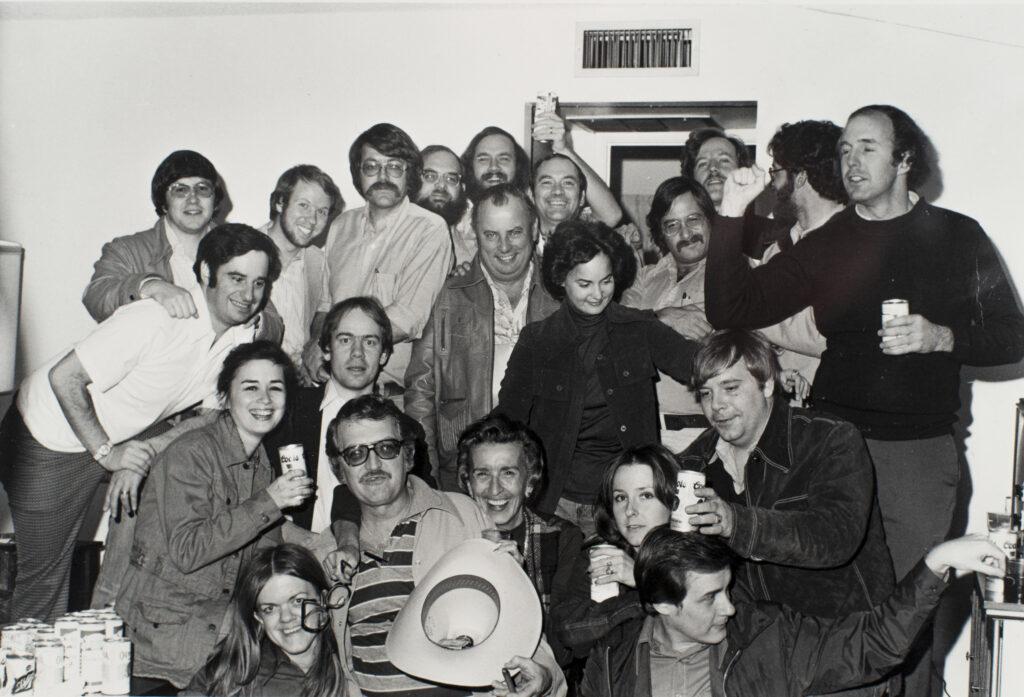

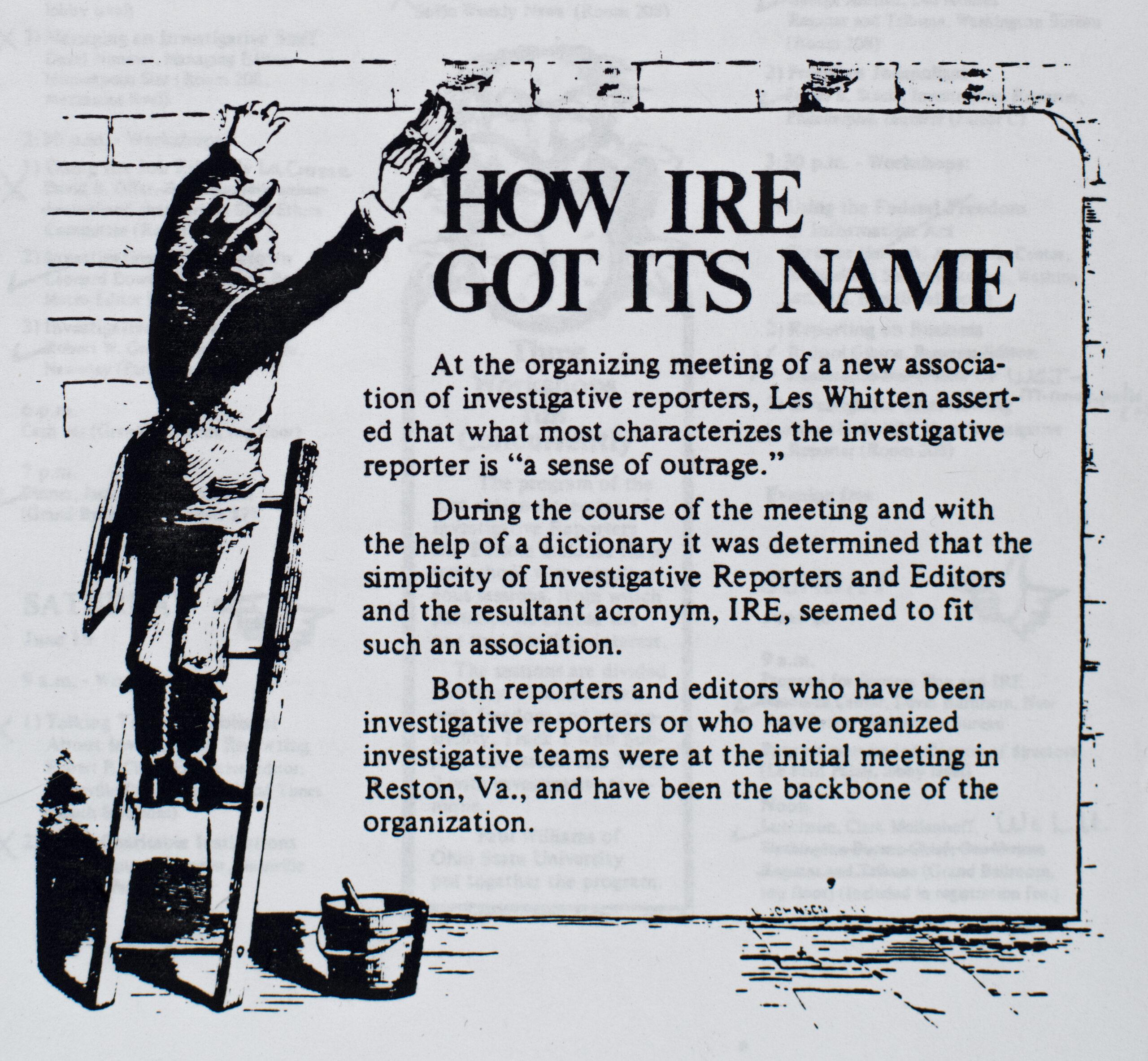
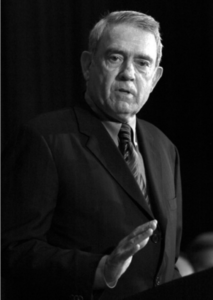
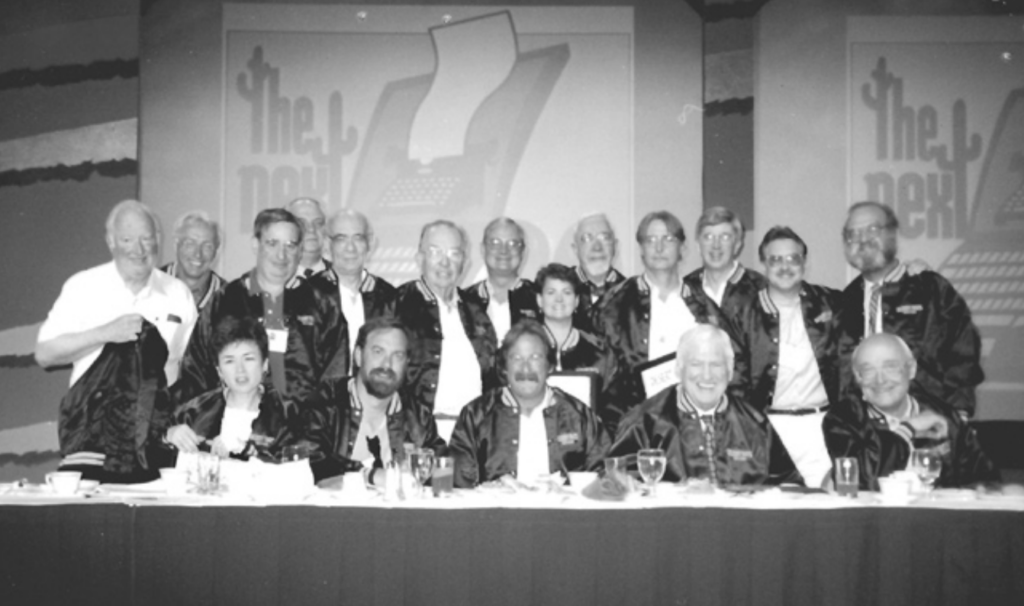
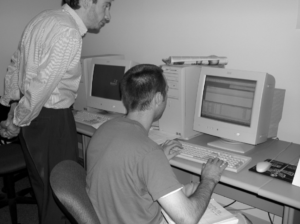
(Feb. 18, 2025) — Longtime IRE member Tom Koch is an accomplished journalist and author, an expert in mapping, data analysis, elder care, medical ethics and so much more.
But in the 1980s, an unsafe work environment threatened to derail that promising career.
“They wanted to put me on permanent disability leave because I couldn't use their computers,” Koch said. “But the problem wasn’t me, it was the computers.”
He successfully fought back, winning concessions that set the first standard for ergonomics within newsrooms in North America.
Read about Koch’s inspiring life, how he went on to cover the U.S. Olympics, wrote more than a dozen books, and how today he’s still publishing and helping fellow journalists cover public health and disability issues in a profile featured at the new digital home for The IRE Journal.
His story is just one of the features in the new version of The Journal, the official publication of Investigative Reporters and Editors, the largest professional journalist organization in the nation. The online publication includes the same in-depth stories and regular departments previously available in the print version, plus new audio and interactive features — including the latest IRE Radio Podcast episodes, recent newsletters and comprehensive content relevant to journalists today.
IRE announced the new digital format in late 2024, designed to expand accessibility and provide members with a more dynamic, interactive experience.
Members can access the online magazine after logging in at ire.org with their regular login and password. The Journal is under the Resources tab on the homepage.
Check back for new stories published regularly. Here are a few in the works:
We want your feedback: If you have an idea for a story, send us a pitch! We welcome any critical and constructive feedback as we strive to improve The IRE Journal. Submit your pitch or general feedback via this Google form, or send us a note by email at editorial@ire.org.
(February 6, 2025) — Investigative Reporters and Editors is pleased to announce the new Koch Continuum Grant in Public Health and Disability Investigative Reporting.
“We are enthusiastic about this major grant program, the largest in IRE’s portfolio,” said IRE Executive Director Diana R. Fuentes. “When budget cuts sweep newsrooms, all too often it’s specialized reporting that takes the hit. The Koch Continuum Grant is designed to boost coverage in the all-important areas of public health and disabilities.”
The program will award two $10,000 grants to journalists pursuing investigative reporting projects focused on public health issues or issues affecting people with disabilities. Grant recipients will also receive financial assistance to present the results of their reporting at the 2026 IRE Conference June 18-21, 2026 in Washington, D.C.
IRE is accepting proposals for the new grant through April 6, 11:59 p.m. ET.
The program is geared toward investigative reporting, so proposals could deal with issues raised by whistleblowers, ethical debates or deep-dive analysis of public records. A proposed project could also demonstrate the potential for ground-breaking legislation or showcase problems unnoticed by those in power. Projects using mapping and GIS are highly encouraged.
To be eligible for this grant, an applicant must meet IRE membership requirements and be a working freelance journalist or journalist working for a news outlet. Projects can be in any form that can be produced and published/aired within a year — print, TV, radio, film, online — for a U.S. and/or Canadian public audience. Grant winners will have until June 1, 2026 to publish/air their projects.
“There are many communities in our backyards that are disproportionately affected by health concerns and inadequate accommodations for disabilities that are frequently overlooked or flat-out ignored,” Fuentes said. “This grant can help enterprising journalists uncover failures that jeopardize safety and quality of life and shine a spotlight on issues that could spark much-needed change.”
This grant program was established through the generosity of a longtime IRE member who prefers to remain anonymous. A veteran journalist and author specializing in medical and public health coverage, his hope is this program will serve others in the area of work he pursued for 25 years.
For more information or to apply for the grant, visit the Koch grant page.
If you’d like to contribute to an IRE program or fellowship, please visit our donation page.
(Jan. 30, 2025) — For this month's IRE Radio Podcast, Francisco Vara-Orta — IRE’s director of diversity and inclusion — reads an excerpt from his Nieman Lab Predictions for Journalism 2025 piece titled, “The quest for diversity evolves.” In it, he conveys what he believes is the future of diversity, belonging, equity and inclusion in the journalism industry, and how we, as journalists, can continue to strive for inclusion in these confusing times.
Production credit: Graduate editorial assistant Nakylah Carter hosted the episode. IRE editorial director Doug Meigs edits the podcast. We are recorded in the studios of KBIA at the University of Missouri School of Journalism.
Music credit: Thoughtfulness (De Wolfe Music)
(Jan. 23, 2025) — Journalists are often known to be good with words. Whether it’s reporting live from a scene or crafting a beautiful narrative, storytelling is at the heart of what we do.
But that’s just one part of the story. Journalists today need to have a grasp on dealing with data, regardless of beat or experience level.
We asked IRE members why data skills are important, even for those who may be new (or hesitant) to using numbers in the newsroom. Here’s what they shared.
“You won't be beholden to government officials, academics or others to ‘interpret’ data for you. You won't need to rely so heavily on the government reports or non-profit/academic studies about the topic you want to write about. You'll also be able to ask the data questions that perhaps the government agency didn't ask for its own report, including cases where they didn't want to ask those questions. It's the best tool you can use for watchdog reporting.” — MaryJo Webster, The Minnesota Star Tribune
“Ask a data journalist about the five things they're most proud of and I'll bet you one of them is something that resulted in a single paragraph done on deadline that made a story better. Rome wasn't built in a day, and you don't have to go from zero to Python programmer in no time flat. Start where you are with the tools you have. Every one of us has done something quick and dirty in Excel that resulted in Good Journalism. The more you do it, the faster you get. And the more you work with data, the better you are at it. And that's the whole point of this, right? Do better journalism.” — Matt Waite, University of Nebraska-Lincoln
“You'll get better at requesting records just by understanding data and knowing how to handle it. Once you learn how to work with data, you get better at recognizing it. If an agency tells you, for example, ‘On average, the wait time is 70 days’ — if you know data, you immediately recognize, ‘Ah ha, there must be a database of this information somewhere’ and then you can request it.” — Janelle O’Dea, Illinois Answers Project
“The reason I got into it all those years ago was that I realized I could do stories that other people couldn't. Instead of three anecdotes and an expert quote, I could get at a topic on a deeper level. … I can do my own analysis, ask and answer my own questions of the data, and then ask better questions of the people responsible.” — Matt Waite, University of Nebraska-Lincoln
“You will have new ways to tackle stories that otherwise seem impossible. Perhaps you have a good question but the humans don't have an answer. Perhaps you know there is a stack of PDFs with information in an unstructured way that you need to find patterns or trends in. Perhaps there is data that nobody else has analyzed before. Data skills will help you overcome those obstacles and more.” — MaryJo Webster, The Minnesota Star Tribune
“It's 2025. We cannot hold government agencies and others accountable without being able to dig into government data.” — Jennifer LaFleur, UC Berkeley Graduate School of Journalism
“For one story, I surveyed 130 hospitals in North Carolina to show few rural sexual assault nurse examiners, which led to congressional action. In another investigation, I analyzed a massive court database to highlight problems with North Carolina’s sexual assault conviction rate. The story helped change state law on consent.” — Kate Martin, APM Reports
“I really enjoy the challenge of solving problems with data and computers. I love the feeling of my brain being on fire knowing that there is a solution to this problem that will result in interesting and newsworthy things if I can just sort it out. Bloomberg just did a story where they set up a camera and used computer vision to analyze the cars coming into Manhattan post congestion pricing, and it's such a cool example of what you can pull off with some creativity and some code.” — Matt Waite, University of Nebraska-Lincoln
“It helps you earn respect on your beat and with your sources. If you are requesting years of data, along with data dictionaries and code sheets — they know you are on top of your shit, and you are serious, and you do your homework. That matters.” — Janelle O’Dea, Illinois Answers Project
“With truth being so elusive these days, data journalism brings facts and transparency to our work. Also, only the cool kids in newsrooms get to work with data. Join the club.” — Jennifer LaFleur, UC Berkeley Graduate School of Journalism
About IRE: Investigative Reporters and Editors is a grassroots nonprofit organization providing training, resources and a community of support to thousands of journalists worldwide. Join us at our upcoming data journalism conference March 6-9, 2025 in Minneapolis.
(Jan. 21, 2025) — The annual Philip Meyer Journalism Award from Investigative Reporters and Editors recognizes the best use of social science research methods in journalism. This year, IRE honors five investigative projects from a pool of exceptionally strong applicants.
Winning projects will be recognized March 7 at the 2025 NICAR Conference in Minneapolis, during the Friday evening Philip Meyer Award Presentation.
The winners are:
“There was an incredible breadth of work from both large and small newsrooms this year, using a variety of methodologies including genealogical research, automated handwriting recognition and a unique research agreement to access private data,” said Sarah Cohen and Brant Houston, co-chairs of the 2024 Philip Meyer Journalism Award Committee.
Judges’ comments: Bloomberg News reporters found a handful of companies that learned to game the American H1-B visa program, which was intended to bring the world's top talent to American businesses. Reporters leveraged statistical analysis to cut through the 1.8 million applications, allowing them to document a story that would have been otherwise impossible. In one instance, reporters found a network of staffing firms linked to an Indian politician that applied for visas for the same people, and took a cut of their salaries when they won the lottery. The reporters used analysis of anomalies to lead them to an algorithm that eventually identified about 3,500 staffing firms registered under multiple names. In all, the effort allowed Bloomberg to document a system that had been previously known only as whispers in the IT community.
Judges’ comments: The Center for Public Integrity and its partners spent two and a half years unearthing the history and consequences of the United States’ most famous attempt at reparations for American slavery. The project, which includes a narrative podcast, used cutting-edge methods to answer a question few journalists would think to ask. Reporters trained an AI model to search digitized Freedmen’s Bureau records, identifying more than 1,250 formerly enslaved people who received land titles from the federal government. They then pieced together countless archival documents from plantation account books to military records in order to identify descendants and map property which had been distributed and then clawed back by the federal government.
Judges’ comments: A two-year investigation by The Dallas Morning News and the San Antonio Express-News found faster access to blood could have potentially prevented dozens of bleeding deaths each day in rural Texas towns and major cities on both coasts. They partnered with a leading trauma researcher at the University of Alabama at Birmingham to conduct a "first-of-its-kind" demographic and geospatial analysis of areas where access to high-level trauma care is the most difficult. They used categories to classify pre- and in-hospital deaths and excluded patients who were dead on arrival.
Judges’ comments: In an extraordinary effort in analyzing billions of records for compelling stories, the Wall Street Journal showed that the Medicare Advantage program allowed corporations to bill taxpayers for illnesses that patients could not have suffered and were never treated. The effort stemmed from a novel use of a research agreement with the federal government, allowing reporters to examine records that had previously been available exclusively to academic and industry researchers. It provided a clear example of responsible use of private data to produce compelling, original stories ignored by the experts.
Judges’ comments: An inspiring investigation by a small newsroom, The Examination, partnering with the Houston Chronicle, mapped how oil companies are polluting Texas communities with hydrogen sulfide gas with little or no repercussions and sickening thousands of residents. The investigation not only used data analysis and extensive interviews, but further bolstered the story by reporters placing testing equipment at the residence of one beleaguered family that detected hydrogen sulfide levels frequently soaring past the state limit.
The Philip Meyer Award is named after the author of “Precision Journalism.” Meyer was a longtime journalist and educator who pioneered the use of empirical methods to improve news reporting. Read more about his legacy here.
Judges for the 2024 Philip Meyer Journalism Award are:
The Philip Meyer Journalism Award follows the rules of the IRE Awards to avoid conflicts of interest. Work that included any significant role by a Meyer Award contest judge may not be entered in the contest. This often represents a significant sacrifice on the part of the individual — and sometimes an entire newsroom. The IRE membership appreciates this devotion to the values of the organization.
IRE works to foster excellence in investigative journalism, which is essential to a free society. Founded in 1975, IRE has more than 4,500 members worldwide. Headquartered at the Missouri School of Journalism, IRE provides training, resources and a community of support to investigative journalists; promotes high professional standards; and protects the rights of investigative journalists. The National Institute for Computer-Assisted Reporting was founded by the Missouri School of Journalism in 1989 and became a collaboration between the school and IRE in 1994.
Contact:

Looks like you haven't made a choice yet.